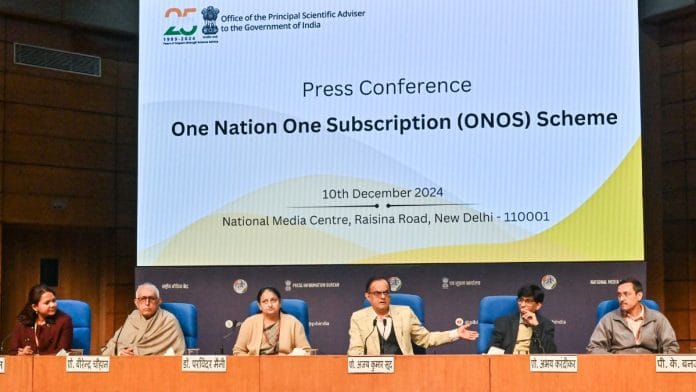New Delhi: Students, faculty members and researchers from over 6,000 government institutes will be able to access more than 13,000 international journals under the Centre’s newly approved ‘One Nation, One Subscription’ (ONOS) initiative from 1 January 2025.
Abhay Karandikar, secretary, Department of Science and Technology (DST), said Tuesday at a press conference that the ONOS initiative will be implemented in three phases.
The first phase will allow all government institutes and universities to access scholarly articles published in 13,400 international journals. In the second phase, access will gradually be opened to private institutes. Finally, in phase three, the government plans to provide universal access to published research studies through designated access points at public libraries.
“We already have 30 publishers, including top international publishers like Elsevier, Springer and Wiley, that have agreed to come on board with us for our initiative. From 1 January next year, we will commence this scheme,” Karandikar said.
Senior ministry officials told ThePrint that while the first phase of the initiative is being implemented, a plan is being prepared to include private institutes in the ambit of the scheme.
“We might charge a small fee from private institutes. But we are still discussing how this will pan out,” the DST secretary said.
The scheme will include not just science disciplines but will have a multidisciplinary approach, providing access to top management, social science and humanities journals.
Also Read: 2024 Physics Nobel for AI scientists. How they pioneered machine learning modelled on human brain
More about ONOS
On 25 November, the Union cabinet approved ONOS, a new central sector scheme which aims to provide countrywide access to scholarly research articles and journal publications. A sum of Rs 6000 crore has been allocated for three years: 2025 to 2027.
The talks to open up research material access were initiated after the government’s National Education Policy (NEP) in 2020, which emphasised research as a necessary tool for achieving excellence in education. The government later came up with the Anusandhan National Research Foundation (ANRF) to promote research and development (R&D) in higher education institutes.
ONOS was conceived as part of this research-focused drive. In 2022, a committee headed by the principal scientific adviser (PSA) to the Government of India was constituted to negotiate with top international journals to provide access to Indian institutes on government terms.
At least 6,380 institutes, translating to around 177.82 lakh users, will benefit from this initiative.
“Even now, research and educational institutes subscribe to some of these journals, but access to users is limited because of budgetary restraint,” PSA Professor Ajay Sood explained at the press conference.
Sood added that with the new policy, institutes will be able to access all material published in approved journals. This will ensure unlimited multidisciplinary access to research material.
“For instance, now science institutes have subscribed only to science journals. But knowledge cannot be seen in silos. The world is moving towards multidisciplinary research,” Sood said.
Officials said that in the coming years, the ONOS initiative will also assist researchers with article processing charges (APC)—a charge that authors need to pay to certain publishers to get their research published.
A fund of Rs 150 crores per year will be set up to support APC on “selected good quality journals”. There are also considerations of providing discounts on APCs to Indian researchers.
(Edited by Radifah Kabir)






